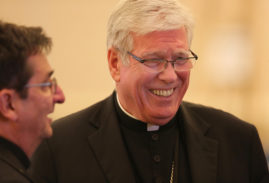
By Christopher White, The Tablet’s National Correspondent
WASHINGTON, D.C. – Pope Francis has taken the rich social tradition of the Church that was championed by Pope John Paul II and “made it front stage,” says Bishop Frank Dewane.
The Bishop, who heads the Diocese of Venice, Florida, and chairman of the United States Conference of Catholic Bishops’ (USCCB) Committee on Domestic Justice and Human Development, said that while there has been a constant tradition of Catholic social activism, he believes there’s been an uptick during the Francis papacy.
His remarks came during an interview with The Tablet during the Catholic Social Ministry Gathering, an annual conference organized by the USCCB’s Department of Justice, Peace, and Human Development. The four-day event includes workshops on Catholic social teaching, followed by in-person lobbying on Capitol Hill on behalf of Catholic legislative priorities.
Bishop Dewane praised John Paul II’s many social encyclicals and letters and said, “he put a lot in place that we’re still using.”
“Pope Francis took that and put it back in the arena,” said Bishop Dewane. “He put his stamp on it with words like the ‘peripheries’ and, sometimes, gave us more precise definitions to concepts.”
As exhibit A, the prelate pointed to both the locations of his papal trips and then the activities he does while in country, such as his visits to prisons, feeding the hungry, and his trips to marginalized neighborhoods.
“He takes that teaching and evidences it,” said Bishop Dewane, who was elected as chair of his committee at the November 2015 bishops’ meeting and assumed office the following November, just a few days after the election of President Donald Trump.
Over the past year, the U.S. bishops have released a steady stream of statements opposing various policy initiatives proposed by the Trump administration – though Bishop Dewane says those statements are issue-driven and not directed at the person behind them.
He said part of the reason the bishops have seemed hyper-active over the past year is that there have been both cyclical issues up for debate and major proposals that have required intervention.
“It’s not every year that our whole tax code gets redone, and when it is, we have something to say about it,” he said.
He pointed to a range of issues where the U.S. bishops have been vigilant this past year.
“If it strikes at life, as Cardinal Dolan once said, ‘Mama Bear is going to fight for her babies.’ When you hear things on Jerusalem, we’re going to talk about it. The Holy See has a long time position on how that should be handled… and when there’s talk about cutting foreign aid and development, the Church will always speak for those who don’t have a voice at the table. You’re going to hear us.”
He also pointed to the convergence of two events that, at least from the outside, indicates more political engagement from the Church.
“You had a change in administration, and you had a Pope that was reaching out and getting very vocal. Meanwhile, our positions were already out there. They’re not new.”
During the first year of the Trump administration, the bishops issued more than 200 statements. While some Catholics have questioned the effectiveness of this and whether the administration is paying any attention to Catholics, Bishop Dewane said that behind the scenes, the U.S. bishops have an active working relationship with major players within the administration, the United States Senate, and the House of Representatives.
Despite what some people would see as losses on tax reform – where the bishops urged serious caution – and an ongoing fight on immigration, Bishop Dewane warned against using a short-term calculus to gauge their effectiveness.
“What we do very much is for the long-term,” he said. While acknowledging that some folks may think the official statements coming from the conference sound like a broken record, he insisted that “it’s a record that doesn’t always get heard in some places.”
When it comes to the standard bishop’s use for considering policy implications, he says the formulation – besides official Church teaching – is quite simple.
Bishop Dewane approaches questions of policy by asking, “Are we allowing human beings to take the God-given human potential they have and let it blossom?”
“Times change, people change, issues change, but the principles remain there.”
“We’re not here for just two or four year elections, the Church is here for the long term,” he explained. “We don’t look at things in terms of winners or losers.”

Nice article